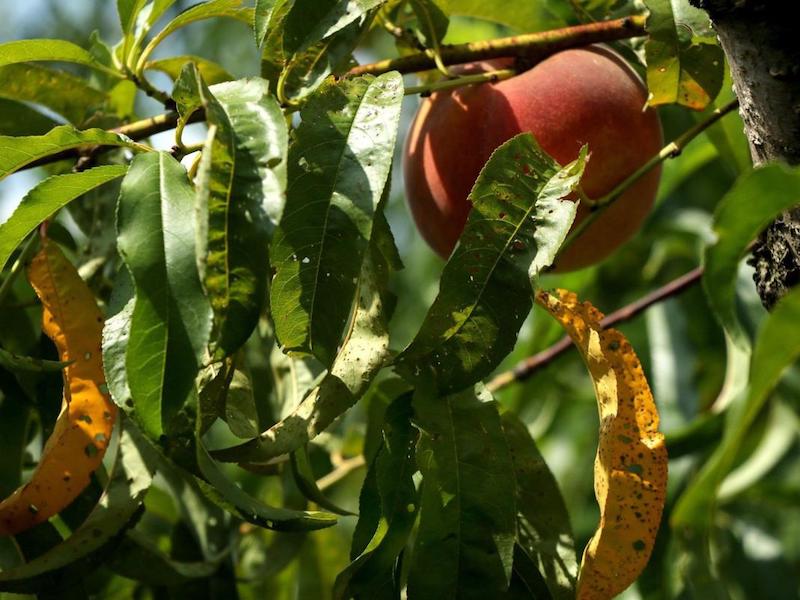
18 Feb Jury awards $265 million to Bader Farms in lawsuit against Bayer, BASF
Dicamba | AgriMarketing | Feb 17, 2020
—
Wave of litigation from U.S. farmers who blame drift-prone dicamba herbicides for millions of acres of crop damage
CAPE GIRARDEAU — One day after finding that uncontrolled drift from the weedkiller dicamba caused millions of dollars in damages to Missouri’s largest peach farm — and that companies behind related products knew they would harm farmers — a jury ruled Saturday that Bayer and BASF should pay a combined $250 million in punitive damages.
The penalty was levied on top of $15 million in compensatory damages awarded Friday to peach grower Bill Bader, who runs Bader Farms, near Campbell, Missouri.
The division of any eventual award would need to be sorted out between Bayer and BASF, which have both indicated they plan to consider their legal options.
Saturday’s verdict marked the conclusion of a three-week trial held in federal court in Cape Girardeau. The case was the first in an advancing wave of litigation from U.S. farmers who blame drift-prone dicamba herbicides for millions of acres of crop damage in recent years, following the release of seed varieties that are genetically engineered to tolerate the chemical.
Those dicamba-tolerant seeds were first introduced by Monsanto for cotton in 2015, and for soybeans in 2016, before the Creve Coeur-based company’s acquisition by Bayer. Many farmers have welcomed the new dicamba technology in their struggle against hard-to-control weeds that have developed resistance to herbicides like Roundup.
But at the time the products were released, newer forms of dicamba intended to be sprayed on the crops had not been approved for use.
The absence of the new sprays — which are less “volatile,” and not as likely to vaporize and drift off target — created a situation where some farmers with dicamba-tolerant crops illegally turned to other forms of the decades-old chemical. Plantings by those farmers were immune to dicamba injury, while any other crop varieties nearby were put at risk of damage.
In 2016, off-target movement of older, illegal dicamba products fueled a steep rise of crop damage complaints in areas such as Southeast Missouri’s Bootheel. Even after new sprays were approved for use starting in 2017, dicamba complaints accelerated, with the Bootheel representing a national hot spot.
“We did not do enough to protect farmers who do not deal with those kinds of (dicamba-tolerant) crops.”
Prior to Saturday’s verdict on punitive damages, lawyers for Bayer argued for leniency, saying that the jury’s Friday rulings were “already resonating” with the company.
“We have the message,” said Jan Paul Miller, an attorney for Bayer. “We did not do enough to protect farmers who do not deal with those kinds of (dicamba-tolerant) crops, like the Baders.
“There was no intent to go out and harm anybody,” Miller added, explaining that the company would make additional efforts to ensure that “when we’re helping one set of farmers, we’re not hurting another set of farmers.”
In a statement issued after the verdict, Bayer expressed empathy for Bader Farms, but said it intends to appeal the decision. The company insisted that its dicamba-based weed control technologies are not at fault.
“We want our customers to know that, as this legal matter continues, we remain steadfast in our commitment to delivering them the effective and sustainable tools they need in the field,” Bayer said in a statement. “According to the U.S. Environmental Protection Agency, these tools do not pose any unreasonable risk when used according to their EPA-approved label. Monsanto took numerous steps to mitigate, and warn about, potential risks associated with its products.”
BASF also said it is exploring legal options, and reiterated the safety and quality of Engenia, its new dicamba spray.
“The evidence revealed that we formulated our dicamba product to significantly reduce off-target movement and conducted extensive testing before receiving EPA approval to market Engenia herbicide in 2017,” the company said in a statement. “BASF will continue to provide training to applicators and emphasize the importance of following the label requirements for Engenia herbicide to achieve on-target applications.”
For Bayer, the ruling marks the second major financial blow that jurors have dealt to its dominant weedkillers in the last two years, joining California verdicts that blamed Roundup for causing cancer in plaintiffs. Those outcomes are under appeal but have helped erode the company’s valuation, and stoked investor concerns.
FREE Consultation | 314-833-4827
Dicamba Drift Lawyers at Peiffer Wolf Carr & Kane are fighting on behalf of farmers and landowners to seek maximum compensation for the damages suffered due to Dicamba. If you suspect that your crops or plants have been damaged by dicamba, contact Peiffer Wolf Carr & Kane by filling out a Contact Form or by calling 314-833-4827 for a FREE Consultation.



